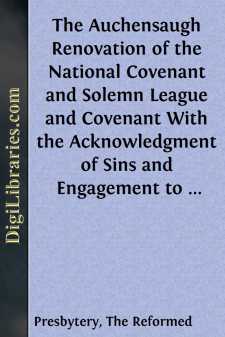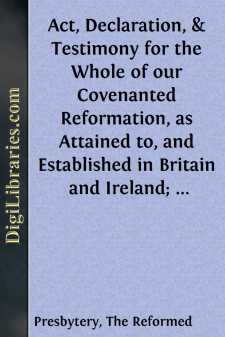Categories
- Antiques & Collectibles 13
- Architecture 36
- Art 48
- Bibles 22
- Biography & Autobiography 813
- Body, Mind & Spirit 142
- Business & Economics 28
- Children's Books 17
- Children's Fiction 14
- Computers 4
- Cooking 94
- Crafts & Hobbies 4
- Drama 346
- Education 46
- Family & Relationships 57
- Fiction 11829
- Games 19
- Gardening 17
- Health & Fitness 34
- History 1377
- House & Home 1
- Humor 147
- Juvenile Fiction 1873
- Juvenile Nonfiction 202
- Language Arts & Disciplines 88
- Law 16
- Literary Collections 686
- Literary Criticism 179
- Mathematics 13
- Medical 41
- Music 40
- Nature 179
- Non-Classifiable 1768
- Performing Arts 7
- Periodicals 1453
- Philosophy 64
- Photography 2
- Poetry 896
- Political Science 203
- Psychology 42
- Reference 154
- Religion 513
- Science 126
- Self-Help 84
- Social Science 81
- Sports & Recreation 34
- Study Aids 3
- Technology & Engineering 59
- Transportation 23
- Travel 463
- True Crime 29
The Reformed Presbytery
The Reformed Presbytery was a group of ministers in the Reformed Presbyterian Church who played a significant role in publishing theological works. One of their most notable works is "The Act, Declaration, and Testimony," first published in 1761, which defends the principles of the Covenanters and their commitment to uphold the original covenants made during the Reformation. They were dedicated to preserving the distinct doctrines of the Scottish Reformation and opposed the mainstreaming of religion in Scotland. Their writings emphasize adherence to the original Westminster Confession and resist ecclesiastical compromise.
Author's Books:
Sort by:
PREFACE. The Reformed Presbytery, at a meeting in Philadelphia, October 6th 1880, "Resolved, That another edition of the Auchensaugh Deed be published," and appointed the undersigned a committee "to attend to this business with all convenient speed." This Presbytery, after forty years' experience, during which opportunities have been afforded for examining the opinions and...
more...
INTRODUCTION. The Presbytery, soon after their erection, being convinced of the expediency and necessity of emitting a judicial testimony, to discover to the world the principles upon which, as a judicatory of the Lord Jesus Christ, they stood, in opposition to the different, so called, judicatories in the land; together with the agreeableness of these principles to the Word of God, the only rule of...
more...



